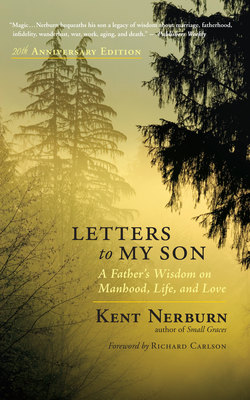Читать книгу Letters to My Son - Kent Nerburn - Страница 16
На сайте Литреса книга снята с продажи.
ОглавлениеCHAPTER 4
RAINALDI’S LESSON
His name was Rainaldi. I was in seventh grade and I think he taught math. We were walking out of an assembly in the school auditorium when I made some smart comment, causing much snorting and laughter among my classmates. Rainaldi looked at me and said, quite gently and clearly, “Nerburn, you start every sentence with the word ‘I.’”
Then he walked away.
If ever a sentence had the power of a koan, that sentence did. With those nine words he changed my life forever.
From that moment forward my perception began to shift. I could no longer look at the world as something that started with me. The self as the focal point had lost its fixed position in my life. Instead, the things I saw, the people I met, the events that filled my day started to become the subjects of my thoughts, and the world opened like a garden around me.
I began the long and still unfinished journey toward seeing the world through the eyes of others, toward knowing the endless joy of entering another’s thoughts and feelings and experiencing them as my own.
The change cannot be overemphasized. So often we build our lives around our positions — “I think, I need, I want.” Yet the world around us has a life apart from our particular perspective, and we can begin to understand this life more fully if we give over our perspective and see from other points of view.
This may seem abstract, but in fact it is obvious. Our language contains a tyranny of separateness that wears away at our sense of unity like water dripping on a rock. “I see something, I do something” — the “I” stands apart from the world around me, linked to it only by an action. Over time my very language increases my separation and isolation by making me see and understand the world as apart from me. I find myself estranged and alone, and I don’t know why.
Other cultures, especially those where “being” is seen to permeate all objects, have unity built into their language. That which they see, not the self, is the natural subject of their thoughts. In ours it is not. We have to make a continual effort to move ourselves out of the center of our point of view.
Very few people ever make that effort. Poets, perhaps, and painters, and artists, and people for whom empathy is a gift of the spirit. But for most of us, the self reigns supreme in both perception and importance.
We need to be shaken from our stance and knocked out of our complacency. We need an epiphany, a koan. Rainaldi gave me mine.
I would wish nothing more than that I could give you yours. But the heart receives such knowledge when it is ready, and your heart will receive it when it is time.
But when it happens, the world will shift in a way you cannot imagine. You will stop trying to find your home in the universe and begin making the universe your home. Judgment will ebb and appreciation begin. Everything will gain the potential to be interesting and beautiful, and every moment will become an opportunity for growth and discovery.
And though you will never completely lose your sense of self — that is the realm of the buddhas and the saints — you will have embarked on one of the most exciting journeys in life. You will have begun to see the world with the heart of an artist, and that, more than anything else, is the secret of keeping the heart eternally young.
